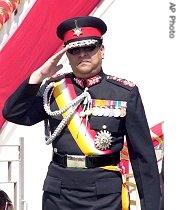
In Iraq, the Al Qaeda did everything in its powers to disrupt the elections to that country's Constituent Assembly held early this year. They failed, and rightly so. In Nepal, the Monarchists are doing everything in their powers to deny Nepal its elections to a Constituent Assembly. And these Nepali Monarchists are succeeding. So the Nepali Monarchists are the Nepali Al Qaeda, only much more vicious and entrenched.
In The News
- China aims to boost ties with isolated Nepal Reuters AlertNet, UK ....by turning down Nepal's request for a visit by Prime Minister Wen Jiabao, China had also shown it did not want to antagonise India, which has condemned the king's actions and urged democracy be restored ...... royal government was reaching out to China and Pakistan to show that it was not isolated ..... expected to invite Gyanendra to visit China ..... Political parties have vowed to launch a nationwide protests against the monarch on April 8, the anniversary of the establishment of multi-party democracy in 1990...... Islamabad would consider supplying arms to Nepal if Kathmandu were to make a formal request
- China minister in key Nepal visit
BBC News ... the Nepalese authorities are attaching a lot of importance to the visit ..... Mr Li's visit follows trips by junior ministers from Pakistan and Cuba..... Pokhara, a police officer died from bullet injuries after being shot
- Barun Roy: Nobody gains from a weak Nepal Business Standard, India Foreign tourists, who, like non-governmental organisations (NGOs) are the mainstay of the Nepalese economy, are staying away from the country for now...... My flight to Kathmandu from Kolkata was two-thirds empty. At the height of the tourist season, Soaltee is reporting no more than 25 per cent occupancy. Hoteliers at the Chitwan National Park have started laying off staff. Wood carvers and tankha painters of Bhaktapur say they seldom had it so bad........ The political oligarchs totally misused the opportunity that was given them, doing nothing but consolidating their individual wealth....... there hasn’t been a single case of bombing in the valley in the two months that the King has been in absolute power ...... If the pollution in the valley is brought under control and roads, water supplies, electricity, and health services in the interiors are developed to acceptable standards, it can be an attractive nursery for many industries and services, software being one of them. The retirement industry can be another, given the degree of sympathy that a lot of outsiders — Americans, Japanese, Europeans, even Indians — have for this lovely country........ What the country needs is real money for real investments, and that can come only from the global private sector, provided the policies and inducements are right.
- LOSING KATHMANDU
Calcutta Telegraph .... crisis is a product of deep-seated structural issues in Nepalese society ...... Gyanendra, whose paranoia makes them immune to both the interests of their own people and international pressure ...... a result of our encasing Nepal in a relationship of subordination ..... matters from building hydro projects to roads required India’s tacit approval. Even though we were in many ways a benign power, we were ultimately paternalist. The overall structure of the relationship lent itself to creating a politics of resentment in Nepal. And this relationship was driven by our conception of security, not by the imperatives of development in Nepal......... the king’s policies had little to do with effectively dealing with the Maoists. As reprehensible as their methods are, they draw upon legitimate grievances and are a viable political movement. Indeed, the present conjuncture is a unique opportunity to bring many of them into the political mainstream. Some of the Maoists realize that their long-term goals require them to gain broader political legitimacy. Democracy itself can be a path to power. The Maoists have, for the first time, allowed regular political parties to operate in areas under their control...... the Indian government is not doing enough to establish political links with the Maoists. A great failing of our policy is that we often let the intelligence establishment define our political objectives........ Now that there is an opportunity for them to be part of the political dialogue, we want someone to destroy them. ...... The king .. apparently believes that India and the United States of America will not put maximum pressure for fear of sending him closer to China....even our ambassador can be sent away without an audience. ........ impress upon the king that now is his last opportunity ...... a groundswell of republicanism inside Nepal ...... The international community will have to think of a decent exit strategy for the king ...... What India needs in the Nepal crisis is deep links with the important actors, the Royal Nepal Army, the Maoists and others. Foreign offices are not good at cultivating these links....... in the past we have attenuated Nepal’s sovereignty based on our security concerns. Now we should perform a constructive role in maintaining democracy in Nepal....... It is about time that Nepalese society writes a constitution for itself, rather than being handed one by the king....
- Bangladesh, Nepal among world’s leading disaster hot spots New Kerala, India
- India, Nepal discuss bilateral issues Economic Times, India Nepal ... continues to receive economic assistance from India.
- Nepal General Strike Protests King's Power Grab Scotland on Sunday, UK Streets were largely deserted ..... The strike today comes two days ahead of an 11-day nationwide strike ..... Biratnagar... factories remained closed and streets deserted today ... Business and schools also remained closed .....security forces were escorting some vehicles along local highways but only a few were willing to take the risk..... Eastern Nepal has two key border points with India, which hundreds of trucks use daily to deliver goods between the two nations. There was no traffic movement on either border points
- Nepal’s political parties to step up protests
Daily Times The demonstrations on April 8 will coincide with an 11-day general strike starting Saturday that Maoist rebels called ....... We are working on strategies to be bring out the mass protest next week. It will be joint rallies organised by the five major political parties ..... the protests haven’t gained momentum because their top leaders are either in detention, exile or hiding
- Chinese foreign minister arrives in Nepal Xinhua, China "I believe my visit will help to further promote friendship and mutual understanding of our two peoples." ..... visit is on the eve of the golden jubilee of the establishment of diplomatic relations between China and Nepal
- China is Nepal's reliable friend: Nepali King Xinhua, China "Nepal firmly supports the one-China policy of your government and will never allow any anti-China activities in Nepal's territory" .....
- India expects China will give "right" advice to Nepal Press Trust of India, India "I expressed the hope that China as a good friend of Nepal will give the right kind of advice to the Nepalese," Foreign Secretary Shyam Saran ..... Saran, who called on Li here today prior to his departure for Nepal .... Li said that just as India is very much concerned about instability in Nepal, so is China. .... The Chinese Foreign Minister, who recalled that Saran had been earlier India's Ambassador to Nepal, asked for India's assessment of the situation in Nepal...... "I said that the steps taken by His Majesty, the King has not led to either an improvement in the security situation in the country nor had led to any economic recovery in the country. In fact, our sense is that in both these areas, the situation has become somewhat worse", Saran said.




